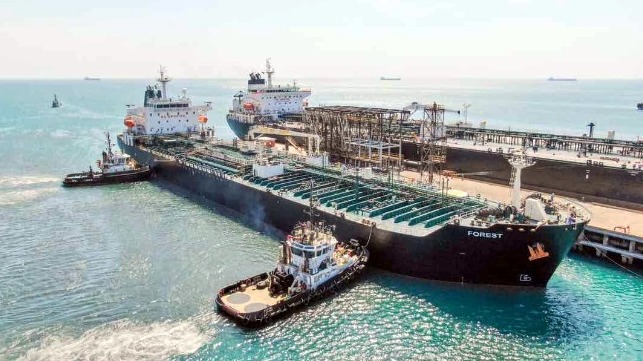U.S. Turns to Courts to Seize Gasoline Shipment to Venezuela

The U.S. Trump administration turned to the courts in its latest efforts to confront Venezuela and interrupt the sanction busting flow of gasoline from Iran to Venezuela.
In a civil-forfeiture complaint filed in U.S. District Court in the District of Columbia, the U.S. said that the fuel is subject to forfeiture as the proceeds of the sale would benefit Iran, individuals, and entities, including the Islamic Revolutionary Guard, designated as terrorist organizations and sanctioned by the U.S. for illegal activities supporting terrorist organizations and the sale of weapons. The suit also seeks to interrupt Iran’s revenues from the sale of the gasoline.
The U.S. District Judge agreed with the U.S. Department of Justice and signed a warrant for the seizure of more than 1 million barrels of gasoline currently believed to be en route to Venezuela on four Liberian-flagged and Greek-owned or managed product tankers. The action however does not go directly against the ship owners or operators.
The U.S. contends that a complex scheme was created to hide the transport and sale of this shipment of gasoline to Venezuela. At least one tanker was reportedly used as floating storage for the gasoline which was later transferred ship-to-ship. Further, in keeping with tactics the U.S. identified in the spring and warned the maritime industry to be on guard against, the ships are reportedly taking steps to obscure their final destination.
The shipment was discovered through the use of confidential informants that led the U.S. to a series of transactions designed to hide the details of the current shipment. According to the U.S. authorities, a series of individuals and affiliates companies were used to hide the true nature of the transaction and bypass the sanctions to permit the chartering of the vessels to transport the gasoline.
Four vessels, the Bella, Bering, Pandi, and Luna, are believed to be involved and were cited in the seizure order. All four vessels remain outside U.S. waters which would make it difficult to carry out the seizure although it may be hoped that the warrant could be used to gain support from other governments in support of the sanctions.
In May, the U.S. Department of State, the Department of the Treasury’s Office of Foreign Assets Control (OFAC), and the U.S. Coast Guard issued updated information is intended to provide tools to counter current and emerging trends in sanctions evasion related to shipping as well as the energy and metals sectors. The advisory warned to be alert for voyage irregularities including attempts to disguise the ultimate destination or origin of cargo or recipients by using indirect routing, unscheduled detours, or transit or transshipment of cargo through third countries.
Despite these actions, Iran was successful is sending five product tankers to Venezuela to provide much-needed gasoline. At the end of May and in early June five oil tankers delivered more 1.5 million barrels of Iranian gasoline to Venezuela. The United States responded by sanctioning tankers that were reportedly dealing with the Venezuela oil trade.
The Greek ship owners later pledged to follow the U.S. sanctions and to monitor for possible violations. As a result, four tankers were cleared from the sanction list. Yesterday, the U.S. cleared four additional tankers and their operators from the sanction list. In the latest action, the VLCC Seahero managed by Thenamaris, the Voyager I operated by NGM Energy, the Delos Voyager managed by Chemnav and the Euroforce managed by Eurotankers were all removed from the sanctions. The operators agreed not to transport additional oil to or from Venezuela and monitor and comply with U.S. sanctions.
It is believed that the Trump administration will continue to employ the sanction and court efforts seeking to deter shippers from cooperating with the Venezuelan and Iranian oil industry.
